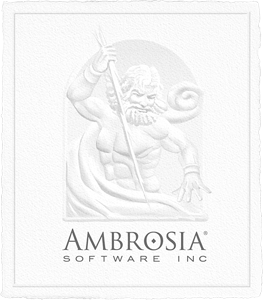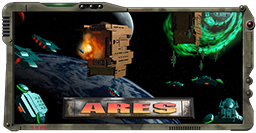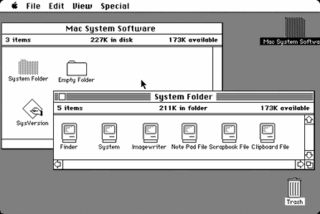Related Research Articles
In computing, cross-platform software is computer software that is designed to work in several computing platforms. Some cross-platform software requires a separate build for each platform, but some can be directly run on any platform without special preparation, being written in an interpreted language or compiled to portable bytecode for which the interpreters or run-time packages are common or standard components of all supported platforms.
Safari is a graphical web browser that is developed by Apple. It is primarily based on open-source software properties, and mainly WebKit. It succeeded Netscape Navigator, Cyberdog and the most recent Internet Explorer for Mac as the default web browser for Macintosh computers. It is supported on macOS, iOS, and iPadOS; a Windows version was offered from 2007 to 2010.
Escape Velocity Nova is a video game developed by Ambrosia Software in collaboration with ATMOS. It is the third game in the Escape Velocity series of space trading and combat games. It was released on March 19, 2002 for Mac OS X and Mac OS 9, and later ported to Windows and released on July 11, 2003. The game's premise, set in a time period after mankind has discovered hyperspace technology, grants the player freedom to take missions, trade goods, steal from other ships, and enter one of six storylines.
Keynote is a presentation software application developed as a part of the iWork productivity suite by Apple Inc. Version 10 of Keynote for Mac, the latest major update, was released in March 2020. On January 27, 2010, Apple announced a new version of Keynote for iPad with an all-new touch interface. It is now also available for the iPhone to download from the App Store (iOS/iPadOS).

Ambrosia Software was a predominantly Macintosh software company founded in 1993 and located in Rochester, New York, U.S. Ambrosia Software was best known for its Macintosh remakes of older arcade games, which began with a 1992 version of Atari, Inc.'s Asteroids from 1979. The company also published utility software. Its products were distributed as shareware; demo versions could be downloaded and used for up to 30 days. Later the company released some products for iOS. Ambrosia's best-selling program was the utility Snapz Pro X, according to a 2002 interview with company president Andrew Welch.

The Mac OS X Public Beta was the first publicly available version of Apple Computer's Mac OS X operating system to feature the Aqua user interface. It was released to the public on September 13, 2000 for US$29.95. Its release was significant as the first publicly available evidence of Apple's ability to ship the long-awaited "next-generation Mac operating system" after the Copland failure. It allowed software developers and early adopters to test a preview of the upcoming operating system and develop software for the forthcoming operating system before its final release. It is the only public version of Mac OS X to have a code name not based on a big cat until the release of 10.9 Mavericks in 2013. The US version had a build number of 1H39 and the international version had build number 2E14.
Scarab of Ra is a Mac OS shareware computer game written in 1987 by Rick Holzgrafe and released in 1988 by Semicolon Software. It is an adventure set within an Egyptian pyramid.

Rogue Amoeba Software, Inc. is a software company that produces audio software, specializing in applications for audio capture for the Macintosh platform. Rogue Amoeba's best-known products are Audio Hijack and Audio Hijack Pro. The Audio Hijack programs allow for users to capture and record audio from any program running under macOS. The Pro version adds support for VST, Audio Unit, and LADSPA plugins, among other features.
Apeiron is a Macintosh game developed and released as shareware by Ambrosia Software. An adaptation of the 1980 arcade game Centipede, it was first released on February 11, 1995. In November 2004, a Mac OS X port was made available.

Rosetta is a dynamic binary translator developed by Apple Inc. for macOS, an application compatibility layer between different instruction set architectures. It gives developers and consumers a transition period in which to update their application software to run on newer hardware, by "translating" it to run on the different architecture. The name "Rosetta" is a reference to the Rosetta Stone, the artifact which enabled translation of Egyptian hieroglyphs.

Casady & Greene, founded in 1984 by Robin Casady, was a software publisher of shareware products, primarily for the Macintosh. C&G published fonts in the earlier days of desktop publishing; founder Casady partnered with Michael Greene, founder of Greene Inc who developed QuickDex. An expansion into games came in 1987, when they published Crystal Quest by Patrick Buckland. This game marked their only foray into the Amiga and Apple IIgs markets.

Ares is a space strategy video game created by Nathan Lamont of Bigger Planet Software, and first released by Changeling Software in 1998. In 1999 the game was re-released as shareware by Ambrosia Software and released as open source software and freeware in 2008. The key feature of the game was its ability to zoom in and out smoothly; this allowed the player to switch between a close-up view, which emphasized space combat skills, and a strategic view of the entire map.

Pangea Software is an Apple exclusive game company based in Austin, Texas, owned and operated by Brian Greenstone. Founded in 1987, the company began as a developer of Apple IIGS games, with the first being Xenocide, which was commercially published by Micro Revelations in 1989. During this period they introduced so-called "24 Hour Games" shareware, a proof of concept of what could be accomplished in a limited time. In 1991, they switched to Macintosh development; notable titles included Power Pete, Nanosaur, Bugdom, Cro-Mag Rally, and Otto Matic. Since 2008, the company has mostly ceased developing Mac games and instead chosen to focus on iOS games, due to the latter being a more lucrative market.

Cap'n Magneto is a shareware graphical adventure game released for the Apple III in 1983 and the Macintosh in 1985. In 2020, the game was re-released as freeware. The game follows Captain Lance Magneto as he attempts to capture the Crown of Control, a mind-control device being used to commit piracy around the planet Rigel IV. As he approaches the planet the device is used on his ship, causing it to crash. The player controls Magneto and tries to collect items from the map in order to capture the Crown and leave the planet.

Freeway is a WYSIWYG web design application for Mac OS X developed by the British company Softpress Systems.

SuperPaint is a graphics program capable of both bitmap painting and vector drawing. SuperPaint was one of the first programs of its kind, combining the features of MacPaint and MacDraw whilst adding many new features of its own.
DX-Ball is a freeware computer game for the PC first released in 1996 by Michael P. Welch and Seumas McNally. The game, originally based on an earlier series of Amiga games known as MegaBall, is patterned after classic ball-and-paddle arcade games such as Breakout and Arkanoid. A level editor was also made available as well. DX-Ball has been succeeded by three direct follow-ups: DX-Ball 2 (1998), Rival Ball (2001) and Super DX-Ball (2004).

The family of Macintosh operating systems developed by Apple Inc. includes the graphical user interface-based operating systems it has designed for use with its Macintosh series of personal computers since 1984, as well as the related system software it once created for compatible third-party systems.

The classic Mac OS is the series of operating systems developed for the Macintosh family of personal computers by Apple Inc. from 1984 to 2001, starting with System 1 and ending with Mac OS 9. The Macintosh operating system is credited with having popularized the graphical user interface concept. It was included with every Macintosh that was sold during the era in which it was developed, and many updates to the system software were done in conjunction with the introduction of new Macintosh systems.
Dejal is a company that develops software for Mac OS X. Established by developer David Sinclair in 1991 in Auckland, New Zealand and since relocated to Portland, Oregon, the company develops and distributes a variety of shareware and freeware applications. Dejal has also released a number of open source projects to be used by other Mac developers in their software.
References
- ↑ "Macworld Online, Fun and Games". Macworld . IDG. July 1995. p. 43. ISSN 0741-8647.
- ↑ Moss, Richard (March 22, 2018). The Secret History of Mac Gaming. Random House.
- ↑ "Norman Duane "Duane" Blehm (1951-1988)". Find A Grave . Retrieved June 20, 2018.
- ↑ Moss, Richard (September 6, 2017). "Researching Mac gaming history part 2: Usenet". Unbound . Retrieved June 20, 2018.
- ↑ Prevost, Ruffin; Terrell, Rob (1994). "Chapter 5: Fun & Games". The Mac Shareware 500: The Last Word on the Best Virus-Free Mac Shareware, Second Edition. Ventana Press. p. 117. ISBN 1-56604-076-0.
For some reason, the game holds a stupid fascination for a few minutes before becoming witless and annoying.
- ↑ Duane Blehm's Source Code on macintoshgarden.org "Source Code for Duane Blehm's games (Stunt Copter, ZeroGravity, Cairo Shootout), released into the public domain by his parents after his passing."
- ↑ Sammis, Ian; Reynolds, David (December 2000). "OS X Xposed, Software & Hardware Compatibility". MacAddict. No. 52. Future Network USA. p. 40. ISSN 1088-548X.
- 1 2 Patterson, Blake (March 29, 2009). "Simple Mac Classic 'Stunt Copter' Comes to iPhone". TouchArcade . Retrieved June 20, 2018.
- ↑ "StuntCopter". Archived from the original on July 3, 2017. Retrieved June 20, 2018.
- ↑ "Apollo Software - Statys". Archived from the original on July 20, 2012. Retrieved June 20, 2018.
- ↑ "The Duane Blehm Collection". Internet Archive. December 27, 2018. Retrieved November 12, 2021.